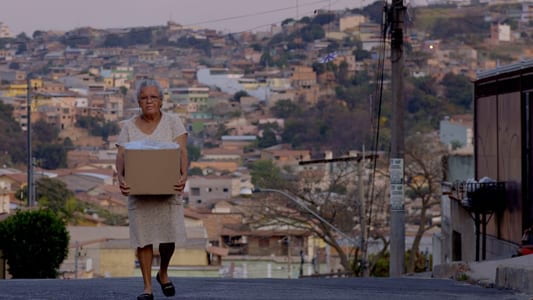
No Coração do Mundo (2019), Gabriel Martins and Maurilio Martins
A few months ago, my friends at Cinema Tropical – a non-profit dedicated to the promotion of Latin American cinema in the U.S. – reached out to me with the idea of programming a series of Brazilian films. Carlos Gutierrez and Mary Jane Marcasiano had the same impression I had: Brazilian cinema had been generating a striking number of exceptional films which couldn’t always find room in the city’s highly competitive festival calendar. The result of these conversations is Veredas – A Generation of Brazilian Filmmakers, a series of films curated alongside Marcasiano taking place at Lincoln Center, December 6-11. The series pairs premieres of some of the most important Brazilian films of the past couple of years with other underseen landmark works made by a generation of filmmakers that have started making features in the past decade. It includes highlights in the international festival circuit with older works by filmmakers whose later films circulated in New York, as well as great films yet to be discovered abroad. The series also covers substantial ground, showing films from a variety of states (this map should give you a good idea) and creating a patchwork-like portrait of Brazil’s aesthetic, cultural, ethnic, and social diversity (this playlist also speaks to that).
Lincoln Center has published a lot of information about the films on their schedule, but if you’re looking for something a bit more thorough – and a bit more personal – I’m breaking down some additional information about each of the films below.
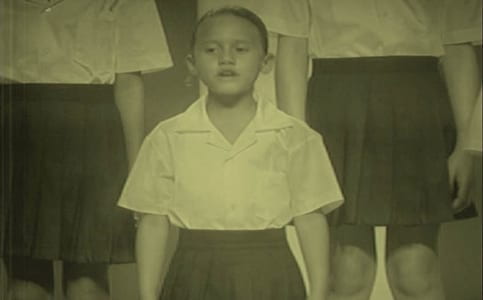
Is the City Only One? (2014), Adirley Queirós
Is the City Only One? (2011), Adirley Queirós
It is hard to overstate the importance in Brazilian cinema of Adirley Queirós‘ (of Once There Was Brasília and White Out, Black In – both screened at Art of the Real) feature film debut, Is the City Only One? Preceding the dystopian afro-futuristic sci-fi universe he created in his following films with other marginalized folks from Ceilândia – a satellite city on the outskirts of Brasília – Queirós combines ethnographic documentary, mockumentary, and fiction to tell the the history of the creation of Ceilândia as part of mass evictions perpetrated by the state. Is the City Only One? inaugurates a different phase in Brazilian cinema, and there couldn’t be a better film to open the series.
Divine Love (2019), Gabriel Mascaro
The new feature by the director of August Winds (special mention at Locarno, 2014) and Neon Bull (special jury prize at Orizonti, in Venice), Divine Love has its city premiere after successful runs in Sundance, Berlinale, and many other festivals. Gabriel Mascaro pushes the narrative envelope in a sci-fi that imagines Brazil as an evangelic state in a new work shot by cinematographer Diego Garcia (Neon Bull, Cemetery of Splendor, Too Old to Die Young). Mascaro will be at Veredas for a post-screening Q&A and a free talk on Saturday.
Clenched Fists (2014), Luiz Pretti, Ricardo Pretti, Pedro Diógenes
One important chapter in the history of new Brazilian cinema involves the creation of production collectives in different parts of the country that produced low and no-budget feature films of great creativity and originality. In 2010, Road to Ythaca, directed by Luiz Pretti (of Art of the Real 2019 selection While We Are Here), Ricardo Pretti, Pedro Diogenes, e Guto Parente (of Brooklyn Horror Festival 2018 selection The Cannibal Club), won the main prize at Mostra de Tiradentes – arguably, the most important film festival for up and coming filmmakers in Brazil – paving the way for a new mode of production that quickly spread throughout the country. Clenched Fists (Locarno) is a meta-meditation on the potential and the limits of collective artistic creation that encapsulates the spirt of this moment, surveying the possibilities of new countercultural cinemas.
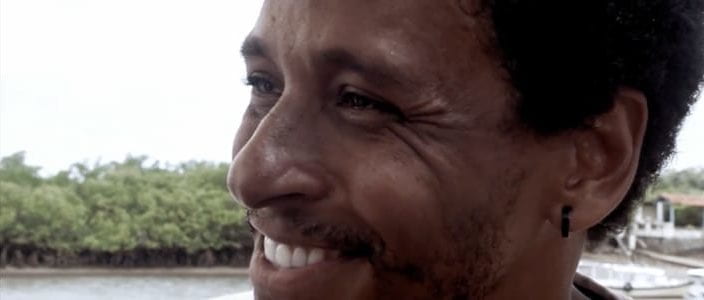
Island (2018), Glenda Nicácio & Ary Rosa
Island (2018), Glenda Nicácio and Ary Rosa
The blooming diversity (in the full sense of the word) of Brazilian cinema results from a complex web of players that is still understudied and underacknowledged, and that involves everything from public universities to online film criticism. Glenda Nicácio and Ary Rosa are the most notable filmmakers to come out of the film school at UFRB (Federal University of the Bahia Recôncavo), which was founded in 2005. Their second feature film, Island (a Soul in the Eye selection in Rotterdam), offers a destabilizing view of the intersection between the arts and class relations through the apparatus of filmmaking workshops in historically underprivileged communities in Brazil.
NoirBLUE – Displacements of a Dance (2018), Ana Pi
A peculiar combination of autoethnography, travelogue, and dance by the dancer and visual artist Ana Pi. The French-based Brazilian director travels to Africa for the first time, and finds fragments of her African roots in conversations that take place in and around the dance floor. Another Soul in the Eye selection, in Rotterdam. The film is 27 minutes long and screens with:
The Blue Rose of Novalis (2019), Gustavo Vinagre and Rodrigo Carneiro
A 2019 Berlinale Forum selection, The Blue Rose of Novalis follows through with some of the questions raised by Vinagre’s previous feature film, I Remember the Crows (Art of the Real 2018). Combining interview, reenactment, and fiction, the film fashions an unstable portrait of Marcelo Diorio, a sort of contemporary dandy figure whose life challenges the distinction between artifice and nature, suggesting a queer rendering of autoethnography.
In the Heart of the World (2019), Gabriel Martins and Maurilio Martins
In the Heart of the World is the latest feature film by the Contagem collective Filmes de Plástico, whose previous film, André Novais’ delightful Long Way Home, played earlier this year at New Directors/New Films. Directed by Gabriel Martins and Maurilio Martins (who are not related), In the Heart of the World premiered in competition in Rotterdam, and is equally invested in tracing the emotional cartography of the city of Contagem – a large city in the periphery of Belo Horizonte, Minas Gerais. However, while Novais focuses on finding drama on a microscale, Gabriel and Maurilio Martins color with a borderline epic quality. With a large ensemble cast that includes Long Way Home‘s Grace Passô, Barbara Colen (of Bacurau), and the great funk carioca superstar Mc Carol, the film seems to find points of convergence between directors as distinct as Spike Lee and Elia Suleiman. The Martins non-brothers will be at Veredas for a post-screening Q&A and a free talk.
Swinguerra (2019), Bárbara Wagner and Benjamin de Burca
Visual artists and filmmakers Bárbara Wagner and Benjamin de Burca‘s newest installment in their radical approach to collaborative ethnomusicology. Premiered as an installation at the Venice biennial, and released as a standalone short film at Locarno, Swinguerra feels as if Walter Hill’s The Warriors (1979) was remade as a rouchian musical in Recife. It plays with:
Necropolis Symphony (2014), Juliana Rojas
Of the director of New Directors/New Film 2017 werewolf fairytale hit Good Manners, and Director’s Fortnight selection Hard Labor (both co-directed with Marco Dutra), Necropolis Symphony (a pun on the city symphony genre, which in Brazil is called “sinfonia da metrópole” – metropolis symphony) is a musical comedy about the perks of gentrification in a cemetery in São Paulo. Originally made for TV, the film has not had a traditional run in the international festival circuit, but has enjoyed great critical success in Brazil. Instead of simply transporting her cinematic world to television, Rojas took the opportunity to create a very peculiar conversation between horror and popular TV genres, such as the sitcom and the soap opera.
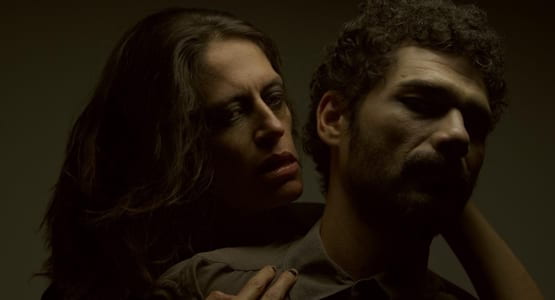
The Sleepwalkers (2018), Tiago Mata Machado
The Sleepwalkers (2018), Tiago Mata Machado
The continental diversity of Brazilian cinema hasn’t always been well represented on the international circuit, which has far too often narrowed a global idea of Brazilian cinema to a specific set of expectations. The Sleepwalkers is a powerful and unique addition to a long history of Brazilian countercultural works that have stood outside the shadow (and the sunlight) of Tropicália. A dusky response to Tiago Mata Machado’s own much-more-colorful (and no less restless) The Residents (2011 Berlinale Forum selection), The Sleepwalkers interrogates the Brazilian reality via the iconography of contercultural cinema (from The Devil, Probably to The Unprecedented Defense of the Fortress Deutschkreus; from Maldita Coincidência to Nocturama; from La Chinoise to Cold Water), making poetry out of pamphlets, and building a city out of its own ashes.
Seven Years in May (2019), Affonso Uchôa
The much-acclaimed new work by Affonso Uchôa (Araby), Seven Years in May is in many ways a counterpoint to the previous feature: many of the elements are here – an attention to peripheral populations in Contagem; an ear for oral fabulation; a laser-cut imprecision between documentary and fiction) but what we see and hear feels like the opposite side of the same coin. The film will be screened with:
Ava Yvy Vera – The Land of the Lightning People (2017), Genito Gomes, Valmir Gonçalves Cabreira, Jhonn Nara Gomes, Jhonaton Gomes, Edina Ximenes, Dulcídio Gomes, Sarah Brites, and Joilson Brites
Any historical account of Brazilian cinema in the past three decades that fails to address the extraordinarily rich work created by indigenous filmmakers can be understood as a desperate attempt to recolonize one’s self. Ava Yvy Vera is an invitation to radically reinvent the vocabulary of cinema because it exercises a different ontology of seeing.
Homing (2019), Helvécio Marins Jr
The second feature by director Helvécio Marins Jr (who co-directed with Clarissa Campolina the beautiful Whirlwind, 2011) premiered at this year’s Berlinale and won the main award at the Jeonju Film Festival. The film is a carefully-woven tapestry between the rural and the modern. The fact that these two adjectives are not articulated as even vaguely oppositional is a good indication of how the film is positioned in relation to the history of Brazilian cinema.
Sol Alegria (2018), Tavinho Teixeira
When I first watched Sol Alegria, a new word came immediately to mind: “Maqueernaíma.” A Rotterdam 2018 selection, Tavinho Teixeira’s follow-up to the lovely Batguano (2014) is like a queer expansion of Joaquim Pedro de Andrade’s Cinema Novo classic Macunaíma (1976). The film brings literary Modernism and the heritage of Tropicália to the present tense, with an ensemble cast that includes the singer Ney Matogrosso – the lead in one of my favorite musical numbers ever televised.
Invisible Life (2019), Karim Aïnouz
Since no generation generates itself, we’ve opened up space at Veredas to honor the work of directors who preceded the timeframe of the series, but whose work has had substantial influence in the filmmakers that followed them. Invisible Life is this year’s Un Certain Regard winner, the Brazilian submission to the Academy Awards, and the latest film by Karim Aïnouz – a filmmaker who blossomed in the New York New Queer Cinema scene with Seams (1997), and have followed up with works such as Madame Satã (2002) and Central Airport THF (Art of the Real 2018). The film plays in New York for the first time, a few weeks before coming back as part of MoMA’s Contenders, which features the museum’s selection of the best films of the year. The screening will be followed by a Q&A with Karim Aïnouz.
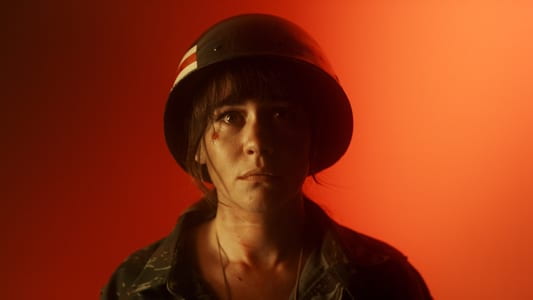
Bedouin (2016), Julio Bressane
Bedouin (2016), Julio Bressane
The second special screening at Veredas alongside Invisible Life, contemplating directors from previous generations whose work remains in a fertile conversation with younger generations of Brazilian filmmakers. Julio Bressane is one of the pillars of Brazilian cinema. His name is featured in many landmark moments of Brazilian film history – from his beginnings alongside Cinema Novo to the radical experimentation with Rogério Sganzerla at Belair – and to this day his cinema has remained inventive, daring, and profoundly dense. It is surprising that, despite retrospectives in Venice, Rotterdam, and special screenings at the Whitney (curated by Arto Lindsay, whose beautiful 2017 record Cuidado Madame takes its title from a Bressane film), Bedouin has not played in the U.S., so Veredas felt like the perfect opportunity for that. The film screens with:
Kbela (2015), Yasmin Thayná
“Kbela” is a gendered pun on the word “cabelo” – hair – switching the “ca” for a “k” more reminiscent of Kimbundu than it is present in Portuguese, and the “o” – typically associated with male words in Portuguese – for the “a” – its female counterpart. Kbela, the film, plays in similar ways with the lexicon of experimental film, Afro-Brazilian culture, and gendered identity, perverting usual meanings to affirm a different gaze. A Soul in the Eye selection in Rotterdam.
Your Bones and Your Eyes (2019), Caetano Gotardo
Rotterdam selection Your Bones and Your Eyes is another subversive exploration of the musical by Caetano Gotardo (of The Moving Creatures). An endless play on creative mismatches, the film closes the series in search of new potentials for the body that may expand the possibilities of the self. It closes the series, therefore, looking toward the future. The screening will be followed by a Q&A with Caetano Gotardo.






Leave a Reply